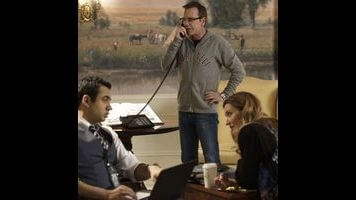Tom Kirkman cares about his job. He cares about America, and, so far at least, there’s no indication that his passion is a hypocritical attempt to cover for some hidden flaw. His only real mistake as president so far might be that he’s a little too nice—he suffers every decision, every tragedy, like a man without any protective cushioning between himself and the outside world. He spends most of “The Mission” half out of his mind worried about the fate of a team of Navy SEALs sent into Algeria to grab Majid Nassar, and when one of those men inevitably dies (I say “inevitably” because, dramatically, you knew at least one was a goner as soon as we started learning names), he’s heartbroken to a point where he can’t even feel any pride in the mission being a success.
Honestly, I’m not sure what to make of this. On the one hand, for a show about a successful terror attack that lays waste to the entire government, it’s sometimes shocking just how, well, naive Designated Survivor can be. Kirkman is an idealist, and while there are people in his new government who plan to stand in his way, most everyone else is noble, dedicated to public service, and determined to get the job done right. There’s no real sense of horror or dislocation that such an attack would presumably cause—the show flirted with that earlier, suggesting that some state governors might go on the offensive, but it’s just a side-plot. This isn’t the end of the world, or even close to; it’s a horrible tragedy, but the country will move on.
On the other hand, that optimism has its appeal, and while the show doesn’t have as clear a sense of liberal ideology as The West Wing (or that show’s more immediately striking dialogue), both series allow us to indulge in the fantasy of a government where the people who serve us really do want what’s best for everyone—and, even more fantastical, most everyone we like tends to agree on what “best” means. While Kirkman’s administration is still dealing with the fallout from the explosion, which means policy decisions have been kept to an absolute minimum, there’s still the clean, refreshing sense of shit getting done by smart, compassionate professionals.
Basically it’s a balm after the long, nightmarish journey of the current presidential election season, and if you can buy into the fantasy, it’s a lot of fun. Tonight’s episode amps up the tension more than any hour since the pilot, giving us the attempt on Nassar, and Hannah’s continued investigations into the mysterious Peter MacLeish. The former is decent, if openly manipulative, suspense, while the latter represents as substantial move forward for the season’s most important plotline, as Hannah finally uncovers actual (and chilling) proof that MacLeish is more than he seems to be.
Cleverly, the episode reveals this discovery intercut between Kirkman waiting in the situation room to learn the results of the Nassar raid. This is done in part because Kirkman invited MacLeish into the room earlier, and the shots of him sitting there interspersed between Hannah explaining how the crew that turned Room 105 (a “hideaway” room where MacLeish hid during the bombing) are all dead, are effectively creepy. But it also adds to the general sense of wrongness that even though Nassar is an almost comically bad guy—child hostages? Really?—he’s probably not the person responsible for the bombing. The raid is a success, and Kirkman’s presidency is temporarily saved, but there are deeper currents here than the new president realizes, and him pitching MacLeish as the potential new vice president is probably not his best idea.
That does suggest that Kirkman may have a flaw after all: his determination to be the most decent man in Washington, while well-meaning, could end up making him vulnerable at best, or foolhardy at worst. It’s a development that could add some needed complexity to all this optimism. The fact that he suffers over every decision, berates himself when a man is killed on his watch, and seems determined to make the best possible choice in any conceivable situation makes him easy to root for, but it seems like an unsustainable approach to a job which demands a certain detachment and willingness to compromise. Designated Survivor is pretty straightforward so far, and it most likely will remain that way, but it wouldn’t be a bad idea to get into why idealism doesn’t just falter because we’re all inherently corrupt; it fails because it expects too much and doesn’t allow any options for compromise.
Apart from that, the only other major development here is Aaron’s investigations into Kirkman’s past, which yields potential drama in the discovery and that Kirkman’s son Liam might not be his son after all. Which is… fine, I guess? It’s hard to get too worked up about a personal crises—one which would, at worst, really just lead to Liam being angsty for a while—when more important things are going on in literally every other plotline. I understand the desire to give the First Lady something to do, but there has to be something more interesting than a paternity suit.
Stray observations
- Kirkman’s eagerness to make friends with MacLiesh is a bit sudden. I get wanting to support someone who supports him, but it’d be nice if he wasn’t quite so eager to trust.
- You knew someone was going to die on the mission. I’ll give a point or two for killing off the commander and not one of the incredibly obvious sacrificial lambs, but it’s still pure Grade A cheese.
- Late in the episode, there’s a scene of Seth, Emily, and Aaron hanging out. I like that, and hope it happens again. (Low-key “Let’s talk about our day” chats between work friends do a lot to build characters and make us appreciate relationships.)

